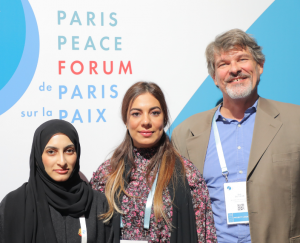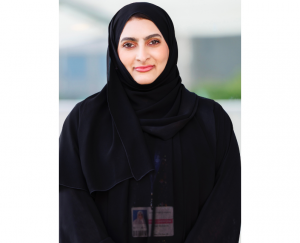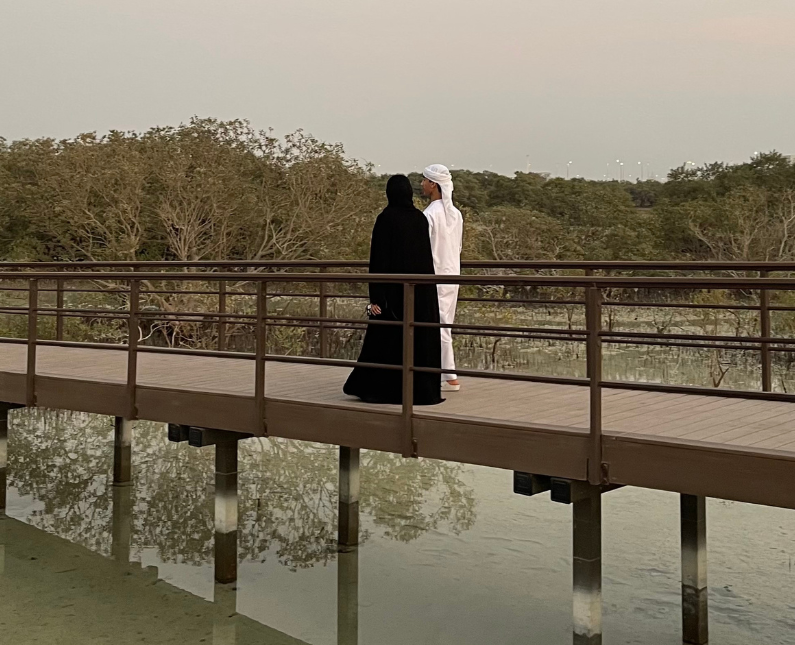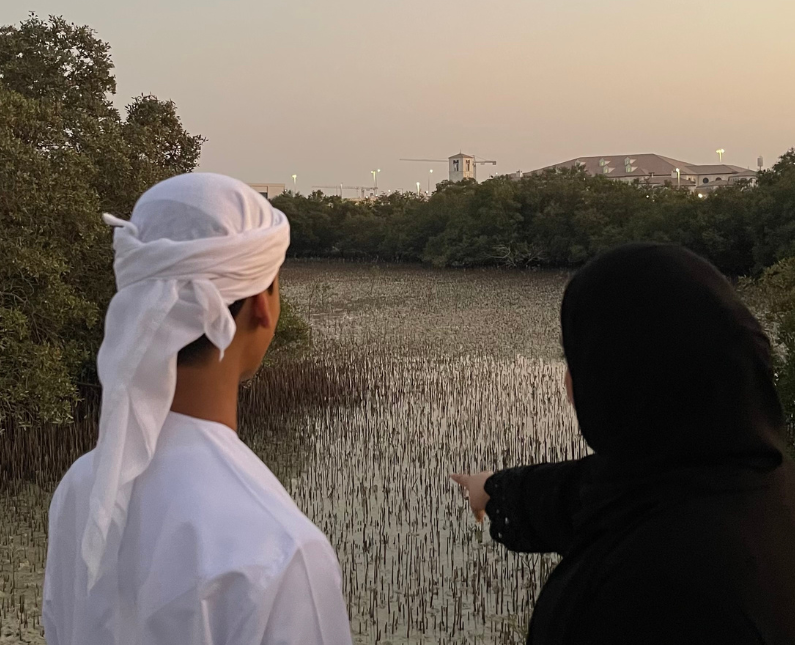On Emirati Women’s Day, we asked Saud Fahad, a curious 14-year-old Emirati boy in Grade 9 to interview his aunt Azhar Mubarak, a communications and media relations specialist at the Mohamed bin Zayed Species Conservation Fund. An Emirati woman with a deep love for nature and her cultural heritage, and a proud guardian of her mother tongue. A passionate reader and award-winning writer since childhood, she has expressed herself through poetry and short stories, and carries a curiosity for travel, discovery, and new experiences.
In her final year at university, an unexpected journey introduced her to the fragile beauty of living creatures and inspired her lifelong commitment to conservation. Bedouin at heart, a daughter of Sheikh Zayed and of the Emirates, she now contributes to species conservation, sharing their stories and inviting others to discover this vital world.
Saud Fahad: Auntie, can you tell me a little about yourself? I mean, I know you work at the Fund, but what exactly do you do?
Azhar Mubarak: Of course, Saud! I work at the Mohamed bin Zayed Species Conservation Fund, focusing on communications and media relations. My job is to share stories about endangered species, raise awareness about conservation projects, and connect communities with nature. Over the years, I’ve organized events, attended conferences, represented the Fund in interviews, and worked to make sure people everywhere know about the importance of protecting our planet. But for me, it’s more than a job, it’s a way to honour our heritage and care for the natural world we’re part of.
SF: How did you first join the Fund, and what has kept you going all these years?
AM: Ah, that’s a story I love to share. Seven years ago, I joined the Fund because I wanted to make a real, tangible difference in protecting species. Before that, I was still a student, and my advisor mentioned an opportunity for an internship at the Fund. I had no idea how much that would shape my career. I became the first intern at the Fund, learning every day, participating in events, and even writing the longest weekly reports among all interns! By the end of my internship, I was honoured to receive the Best Intern Award, a very proud moment for me, especially since I didn’t even know such an award existed.
A year after my internship, the Fund offered me a permanent position, and I accepted immediately. From day one, I felt I had found a place where my work could truly matter, helping protect species, support important projects, and contribute to real change. What motivates me most is seeing the tangible impact of our efforts worldwide and knowing that every task, big or small, helps safeguard life on Earth. Beyond that, my love for nature and animals was instilled in me by Sheikh Zayed and nurtured by Sheikh Mohammed, reminding me that conservation is a responsibility we carry every day. On a personal level, my father, your grandfather, Saud, taught me from a young age to value camels
SF: Where did your love for conservation come from?
AM: Growing up as a Bedouin girl in Abu Dhabi, nature was all around me. Our weekends were spent at the farm, by the sea, hiking the mountains of Fujairah and Al Ain, or swimming at Abu Dhabi’s beaches in the late 90s. I also spent a lot of time in “Al Ezba,” a place that connected us to traditions, the land, and the values of care and respect. I memorized the Qur’an as a child, and one verse that always stayed with me is: “And there is no creature on [or within] the earth or bird that flies with its wings except [that they are] communities like you.” (Al-An’am: 38) My father nurtured my curiosity and taught me responsibility, respect for nature, and the importance of giving back, lessons that shaped who I am today.
SF: You’ve travelled a lot for work. What was your first international experience like?
AM: My first international experience came in early 2019, when I had the chance to represent our work in Bali. It was the closing of the dugong and seagrass project, which was very close to my heart because I had contributed to it during my internship. Standing there, in another country, and seeing how a project that I once worked on as a student had grown into something that touched communities and inspired others, it gave me a deep sense of pride and belonging.
 Later that year, I found myself in Paris at the Peace Forum in November. The experience carried a different weight, but it was just as profound. Sitting among global leaders, representing both the Fund and Emirati youth, I felt a mix of pride and humility. It struck me deeply that conserving species is not only about safeguarding animals or plants, but also about preserving balance, coexistence, and ultimately, peace on Earth. In that moment, far from home, I felt an overwhelming sense of responsibility to carry this message forward with conviction.
Later that year, I found myself in Paris at the Peace Forum in November. The experience carried a different weight, but it was just as profound. Sitting among global leaders, representing both the Fund and Emirati youth, I felt a mix of pride and humility. It struck me deeply that conserving species is not only about safeguarding animals or plants, but also about preserving balance, coexistence, and ultimately, peace on Earth. In that moment, far from home, I felt an overwhelming sense of responsibility to carry this message forward with conviction.
SF: And after Paris, did you have other big events?
AM: Yes! In January 2023, I organized a meeting with Salima and Aziz, my colleagues for more than 100 conservation experts from around the world, attending the IUCN Council meeting in Abu Dhabi. I also hosted an extraordinary traditional Emirati evening in the desert for the delegates, blending heritage and conservation in a magical night. It was a beautiful reminder that storytelling and culture strengthen global connections.
SF: Any funny incidents that makes you smile when you think about it?
AM: One funny and memorable incident that always makes me smile happened in 2019 during the Paris Peace Forum. A journalist suddenly appeared at our booth and asked me to do an interview on the spot. I hesitated a little because I’m naturally camera-shy and hadn’t prepared anything, but when I started speaking from my heart about the Fund, the work we do, and why we were there, I just couldn’t stop talking!
The journalist was genuinely shocked; he couldn’t believe it was my first time on live TV. He later told me it was the easiest interview of his life because I spoke naturally, didn’t need much preparation, and didn’t make any mistakes on air. That moment taught me an important lesson: when you speak from the heart about something you love and believe in, your words carry feeling and can convey your message more powerfully than any script. I felt proud of myself for stepping out of my comfort zone and realizing that authenticity can create its own confidence.
SF: And COP28? I remembered I didn’t see you for two weeks that time.
AM: COP28 was the pinnacle of my career so far. I wasn’t representing the Fund directly, but I was part of the team supporting Her Excellency Razan Al Mubarak. Being part of that team filled me with pride and joy because we contributed, even in a small way, to the success of the UAE’s COP28, the best and most unique edition yet. Seeing collaborations grow, being part of strategic leadership efforts, and witnessing the UAE’s role in shaping global conservation efforts gave me lasting pride.
 SF: I saw you at Abu Dhabi Internation Book Fair this year, but we were leaving, and I didn’t get a chance to say hi. What were you doing there? Was it something about work?
SF: I saw you at Abu Dhabi Internation Book Fair this year, but we were leaving, and I didn’t get a chance to say hi. What were you doing there? Was it something about work?
AM: Yeah, I remember! I was there for one of my favourite projects called “Tales of Conservation.” It’s all about bringing stories of endangered animals to life for children, making learning fun, interactive, and memorable. Seeing their eyes light up when they hear these stories reminds me why storytelling is so powerful. I also use videos, social media, and other creative tools to reach even more people, showing that conservation isn’t just about facts; it’s about feeling connected to the animals and the planet. Every session is a little adventure, and I love that it inspires kids to care about the world around them.
SM: Do you feel pressure representing the Fund?
AM: Absolutely. But I see it as an opportunity to inspire, educate, and share stories that matter. Every conversation, interview, or event is a chance to make people care about species.
SF: How does Emirati culture influence your work?
AM: Our heritage is deeply connected to conservation. Falcons, camels, and horses are more than animals, they embody patience, strength, elegance, courage, and resilience. They remind us why caring for nature is part of understanding life. Cultural values guide modern conservation, blending tradition with science.
SF: That’s amazing! What lessons do these animals teach?
AM: Animals teach resilience, empathy, and patience. Oryx families care for one another, turtles return to their birth beaches, and falcons soar with purpose. By watching them, we learn respect for life, patience, and responsibility.
Saud: Have children taught you anything surprising?
AM: Absolutely! Their curiosity is endless, and they notice details adults often miss. Their questions remind me that conservation starts with observation, wonder, and asking the right questions.
SF: What drives you outside of your work?
AM: Outside of work, I enjoy activities that nurture both body and mind. I practice Pilates and yoga to stay balanced and focused. I love spending time with children, learning from their curiosity and energy, and I cherish moments with my family, especially engaging in activities with our grandchildren. I read extensively, write poetry and short stories, watch documentaries about animals, cultures, and traditions, and enjoy learning traditional crafts like talli and sewing. Creativity is another passion of mine; I play the piano and love capturing moments through photography. I embrace adventure, and long walks are one of my favorite ways to clear my mind, reflect, and connect with the world around me.
SM: Do you have any hobbies?
AM: I have many! I love pottery and make my own cups, practice archery with my father, create short films, and take photographs that tell stories. I organize family gatherings, try new recipes, bake despite gluten sensitivity, and meditate. Creativity, adventure, and connection with people keep me energized and inspired.
SF: What are your happiest moments?
AM: Seeing tangible impact, watching projects grow, children getting inspired, and communities taking pride in protecting nature. COP28, especially, was unforgettable.
SF: How do Emirati women contribute to conservation?
AM: I always start by thinking of Her Highness Sheikha Fatima bint Mubarak, whose lifelong dedication to education, women, and environmental awareness has empowered generations to act for the greater good. Emirati women today carry this legacy forward, they are leaders, educators, and advocates, shaping communities and driving meaningful change. On Women’s Day, we celebrate their resilience, dedication, and empowerment. I’m personally inspired by Her Excellency Razan Al Mubarak, whose vision, leadership, and humility guide every step I take. Representing my country and contributing to work that is both beautiful and impactful fills me with pride, especially knowing that our efforts help protect species and ecosystems across the globe.
SF: And the UAE’s role globally?
AM: The UAE shows that heritage and innovation can protect nature. From Arabian oryx restoration to marine reserves, our nation sets an example for the world.
SF: What do you want your legacy to be?
AM: I hope to inspire generations, connect people to wildlife, and show that heritage, passion, and science together can protect our planet. I want young Emiratis to lead, protect, and care for biodiversity.
SF: If you could teach me everything about nature in a day, where would you start?
AM: I’d start with the connections, how species, habitats, and humans are all intertwined. I’d show you that even the smallest action can ripple across an ecosystem, affecting countless lives in ways we may not immediately see. Then, we’d dive into stories of conservation: how people around the world care for nature without causing harm, how communities adapt to protect species, and how each generation inherits the responsibility to safeguard our planet. By the end of the day, you’d understand that connecting with nature is not just about facts, it’s about empathy, wonder, and realizing that every one of us has a role in keeping the Earth alive and flourishing
SF: What are your proudest moments?
AM: There are many moments that fill me with pride, but one that truly stands out happened at the Paris Peace Forum. I had the honor of seeing His Excellency Sheikh Nahyan bin Mubarak Al Nahyan, Minister of Tolerance, and he recognized me from my university days and greeted me warmly. We even took a beautiful photo together. Our traditional Emirati attire naturally drew the attention of many foreign journalists, making the moment even more special. That day, I felt immense pride and honor in representing my country and being acknowledged by its leaders. Beyond that, moments like COP28, where the UAE hosted the best edition yet, remind me of the pride I feel in contributing to its success and supporting global conservation efforts.
SF: Any final advice for someone my age?
AM: Start small. Observe, learn, share, and inspire. Responsibility begins with awareness, and even tiny actions can make a big difference.
SF: What inspires you every day to continue your work?
AM: You, Saud. Your curiosity and love for our land remind me that the future is bright, and that every effort we make matters.
SF: Thank you, Auntie.
AM: And I’m proud of you, Saud. Your curiosity and respect for nature show that the next generation is ready to carry our heritage forward.



